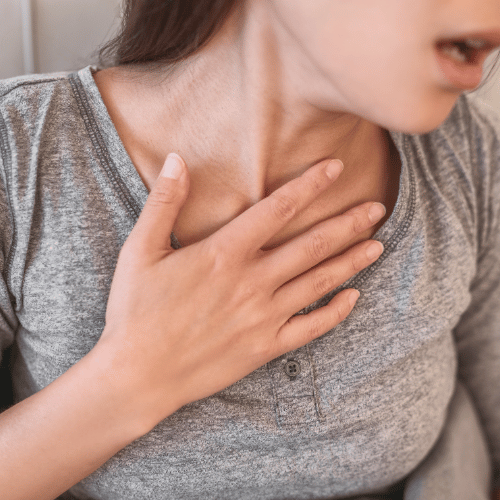
From Marathon Runner to Chronic Knee Pain
This is Tony’s story. He came to us with ongoing knee pain that worsened at work.
Conditions > Chest Infections
Chest infections are quite common and are frequently caused by bacteria or viruses.
These infections can affect your lungs and airways, leading to discomfort and, in some cases, serious health complications.
If you suspect you have a chest infection, it is crucial to see a doctor promptly for evaluation and care.




Chest infections, also known as respiratory infections, affect the lungs and the airways.
These infections can vary from mild to severe and include several key conditions. Bronchitis is an inflammation of the bronchial tubes, which carry air to and from the lungs, often leading to coughing and mucus production.
Pneumonia is an infection of the lungs that causes the air sacs (alveoli) to fill with fluid or pus, making it difficult to breathe, and pleural infection involves an infection of the pleura, the membrane surrounding the lungs.
The main sings of chest infections to look out for include:


Depending on the symptoms, diagnosing a chest infection may include:
Treatment for chest infections depends on the underlying cause and severity. Antibiotics are prescribed for bacterial infections, while antiviral medications may be used for certain viral infections if prescribed by a doctor.
Cough medicines can help ease coughing and discomfort. Rest and hydration are essential for recovery, as they support the body’s healing process. In severe cases, hospitalisation and more intensive treatment may be required.
Our team is here to provide personalised care and support throughout your treatment journey.


Preventing chest infections involves several key practices. Getting vaccinated against the flu and pneumonia can help protect you. It is also crucial to avoid smoking and limit exposure to smoke, as it can damage your lungs and increase your risk.
Good hygiene plays a significant role as well; frequently washing your hands and avoiding close contact with sick individuals can reduce the spread of infection.
Additionally, maintaining a healthy lifestyle by eating a balanced diet and engaging in regular exercise helps to strengthen your immune system and improve your overall health.
Chest infections can be caused by a range of pathogens, each presenting its own set of challenges. These include:


Risk factors include:
Chest infections can be very debilitating and need proper medical care. Give us a call or use our online booking system to make an appointment and speak to a specialist who can help you understand the best course of treatment and refer you for any necessary testing.
We work with experienced consultants & healthcare professionals who have received positive feedback from our patients, and with whom we have established long-term relationships.
Use our online booking engine or book your test by giving us a call.
On the online booking engine select the “appointment type” you need.
You will be seen by one of our friendly doctors or trained clinicians.
Latest Episode
Tune in to our podcast to explore the world of healthcare and learn from distinguished special guests. We cover everything from preventative measures to cutting-edge treatments so that you can stay informed and up-to-date on health-related things.

This is Tony’s story. He came to us with ongoing knee pain that worsened at work.

A lot is said about medical weight loss but we are here to debunk the myths for you.

This is Kate’s story. She visited us last year and saw great improvements in her health and quality of life.
Subscribe for latest updates & news

From same-day private GP and blood test appointments to visa medicals, a sexual and reproductive health clinic, and preventative health screenings, we are here to help.
Contact Us
Accepted Insurance Companies






Please note that Walk-in Clinic is a private medical centre & not an NHS service. Harley Walk-in Clinic Ltd company registration no. 07472804